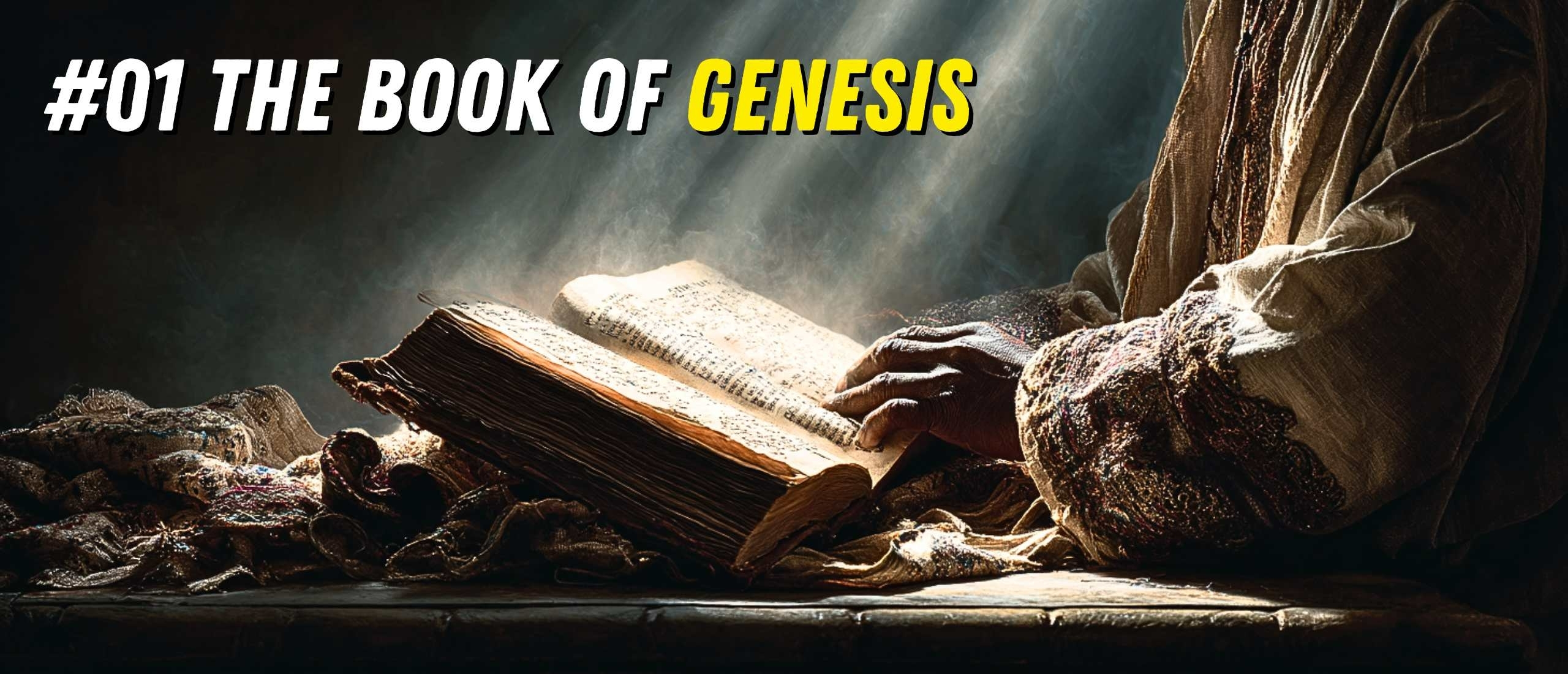
What if I told you that no matter how many times you stumble, God's grace never runs out? "For we do not have a high priest who is unable to empathize with our weaknesses, but we have one who has been tempted in every way, just as we are, yet he did not sin." (Hebrews 4:15)
Unlike every other belief system that demands you earn favor, Christianity flips the script. It's not about being good enough or checking all the right boxes. It's about grace, unearned, undeserved, and freely given. Today you're going to learn how that changes everything.
The Burden of Perfectionism
Have you ever felt like you had to be perfect for God to accept you? Like no matter how much you do, how many prayers you say, or how much effort you put in, it's never quite enough? Maybe you've thought, If I just tried harder; if I was more disciplined, if I had more faith, then God would be pleased with me. A lot of people carry this invisible burden. The idea that we have to earn God's love by being flawless. That if we make mistakes, if we struggle, if we fail, then we are somehow unworthy of grace.
This mindset is everywhere. You see it in the way people try to clean themselves up before coming to God. The way some avoid church because they feel like they don't belong. The way others serve tirelessly, exhausting themselves in ministry, secretly believing that their worth is tied to how much they do. And when failure inevitably happens? When sin creeps in, when weaknesses are exposed? That's when shame takes over.
Some people hide. They pull away from God, convinced He must be disappointed in them. Others double down, striving even harder to prove their worth, hoping that maybe, just maybe, they can make up for their shortcomings. But that's not how grace works.
The perfectionism trap is particularly insidious because it masquerades as holiness. We convince ourselves that our constant striving, our endless self-improvement projects, and our relentless pursuit of spiritual maturity are good things. And in some ways, growth and discipline are important. But when they become the basis for our acceptance with God, they become chains rather than wings.
Sarah's Story: The Exhaustion of Earning Love
Let's talk about Sarah. Sarah grew up in church. She knew the Scriptures, led Bible studies, and served in nearly every ministry available. From the outside, she looked like the perfect Christian. But inside, she was exhausted. No matter how much she did, she felt like it wasn't enough. She remembered every sin she had ever committed. The lies she had told. The moments of doubt. The times she had chosen her way instead of God's.
And though she believed in grace, she secretly felt like she had to earn it. She told herself, If I can just be a little better; if I can prove I'm truly changed; then maybe God will finally be pleased with me. So, she worked harder. She prayed longer. She sacrificed rest, joy, and even relationships, thinking that somehow, all this effort would make her feel worthy. But the guilt never left.
One evening, after serving at church all day, Sarah sat alone in her car, overwhelmed by an aching emptiness. Tears streamed down her face as she whispered, Why do I still feel so far from God?
Sarah's experience represents countless believers who have turned Christianity into a performance-based relationship with God. They know the right answers about grace, they can quote the relevant Scripture verses, but deep down, they're still trying to earn what's already been freely given. This exhaustion isn't just physical, it's spiritual and emotional. It's the weariness that comes from trying to be worthy instead of resting in the worthiness that Christ has already provided.
Jesus Understands Your Struggle
Maybe you've been there too. Maybe you know what it's like to try your hardest, only to feel like you're still falling short. Maybe you carry the weight of your past, afraid that no matter how much you change, God still sees the old version of you. Maybe you've convinced yourself that grace is for other people; people more deserving, people more faithful, people who don't struggle as much as you do.
But here's the truth: Jesus never asked you to carry that weight. Hebrews 4:15 tells us that Jesus understands our struggles. He doesn't just see them from a distance, He feels them. He knows what it's like to be tempted, to be weary, to experience the full weight of human weakness. And yet, His love for you does not get watered down.
This understanding isn't theoretical or distant. Jesus lived in human flesh. He experienced hunger, thirst, exhaustion, betrayal, rejection, and every form of temptation that we face. When He looks at your struggles, He doesn't do so with the cold judgment of someone who has never experienced weakness. He looks with the compassionate eyes of someone who knows exactly what you're going through.
It's not dependent on how well you perform. It's not measured by how much you accomplish. His grace is not something you have to earn, it's something you are given. Imagine a child learning to walk. They stumble. They fall. Over and over again. And what does a loving parent do? They don't scold the child for falling. They don't say, You should have gotten this right the first time. No, they encourage them. They pick them up. They celebrate every small step.
The Father's Heart Revealed
Jesus isn't waiting for you to get everything right before He loves you. He's not keeping score, waiting for you to prove that you're worthy. He already made that decision when He went to the cross. When He stretched out His hands, He wasn't just paying for your sins, He was making a statement. He was saying, I choose you. I love you. Not because you're perfect, but because you're mine.
Think about the prodigal son. He wasted everything. He made choices that should have disqualified him from his father's love. But when he finally returned home, what did his father do? He didn't demand an apology. He didn't ask for proof that his son had changed. He ran to him. He embraced him. He celebrated him. That's grace.
The prodigal son's story reveals something profound about the heart of God. The father in the story doesn't just passively wait for his son to return, he actively watches for him. The text tells us that while the son was still a long way off, his father saw him and was filled with compassion. This suggests that the father was regularly looking toward the horizon, hoping for his son's return.
This is how God waits for us. Not with arms crossed and foot tapping, but with eyes scanning the horizon, ready to run toward us the moment we turn in His direction. The father's response wasn't cautious or conditional. He didn't say, "Well, let's see if you've changed this time." He ran. He embraced. He celebrated. This is grace in action.
It's not a reward for good behavior. It's not a prize for those who have everything together. It's a gift. So, the real question isn't whether you deserve God's grace. The real question is; will you accept it? Because the struggle with grace isn't about whether it's available. It's about whether we'll stop running, stop striving, and simply receive what's already been given.
How Grace Really Works
Now, you might ask: how does that work? What about those who don't know how to receive this gift? Those who still feel left out? How do they navigate to the gates of grace?
A lot of folks believe no one truly understands what they're going through. Like their struggles are too personal, their failures too deep, and their temptations too strong. It's easy to think that God is distant; that He's watching from heaven, grading our performance, deciding whether we've earned His approval. But what if I told you that Jesus understands you better than anyone else ever could? That He knows what it's like to wrestle with temptation, to feel the weight of human weakness, to face trials and suffering, yet still extends grace freely?
That's what Hebrews 4:15 tells us: For we do not have a high priest who is unable to empathize with our weaknesses, but we have one who has been tempted in every way, just as we are, yet he did not sin. Jesus wasn't just fully God; He was fully human. That means He knows what it's like to be exhausted. To feel hunger. To be betrayed by people He trusted. To be rejected, misunderstood, and falsely accused. And yet, through it all, He never sinned.
This humanity of Jesus is crucial to understanding grace. If Jesus had never experienced human weakness, His compassion toward us might seem condescending, like someone who has never been poor giving money advice. But Jesus' empathy is earned through experience. He knows what it feels like when the spirit is willing but the flesh is weak. He understands the internal conflict between what we know is right and what we do.
Grace Versus Religion
Unlike earthly religious systems where people have to work to earn favor, where they have to sacrifice, strive, and prove themselves worthy, Jesus flipped the script. Instead of making us climb up to Him, He came down to us. Instead of demanding that we earn grace, He freely gave it. And nowhere is that more beautifully illustrated than in the story of the woman caught in adultery.
Picture the scene. Jesus is teaching in the temple, surrounded by a crowd, when suddenly, there's a commotion. The religious leaders, Pharisees and scribes, drag a woman into the courtyard. She's humiliated, barely clothed, trembling in fear. One of the Pharisees steps forward and announces, Teacher, this woman was caught in the act of adultery. The law of Moses says to stone her. What do you say?
It's a trap. If Jesus says to let her go, they'll accuse Him of breaking the law. If He says to stone her, they'll claim He's not the merciful teacher He claims to be. The crowd holds its breath. The woman stares at the ground, waiting for the first stone to strike. But instead of answering, Jesus kneels and starts writing in the dust. The Pharisees press Him. Well? What's your verdict?
Jesus stands, looks them in the eyes, and says, Let any one of you who is without sin be the first to throw a stone at her. Silence. One by one, the accusers drop their stones and walk away. Until finally, it's just Jesus and the woman. He looks at her and says, Woman, where are they? Has no one condemned you? She shakes her head. No one, Lord.
And then Jesus speaks the words that change everything: Neither do I condemn you. Go now and leave your life of sin. No punishment. No shame. Just grace.
The Heart of Jesus Revealed
This is the heart of Jesus. Where religion says, Work harder, be better, earn God's love, Jesus says, You are loved, right here, right now. Where shame whispers, You've gone too far, you're too broken, Jesus declares, There is no condemnation for those who are in Me. The woman in the story had no defense. She was guilty. But Jesus didn't define her by her worst mistake; He saw her through the lens of grace. And He does the same for you.
What's remarkable about this story is that Jesus doesn't minimize the woman's sin. He doesn't say, "What you did wasn't that bad," or "Everyone makes mistakes." He acknowledges the reality of her sin but refuses to let it define her future. His grace doesn't excuse sin, but it does provide a way forward beyond sin.
This is often where people misunderstand grace. They think that accepting God's grace means pretending sin doesn't matter or that there are no consequences to our choices. But that's not what grace does. Grace acknowledges the full weight and reality of sin while providing a way of escape and transformation that we could never achieve on our own.
Jesus Our Advocate
But Jesus didn't just forgive sinners when He walked the earth, He continues to intercede for us even now. Hebrews 7:25 tells us that Jesus always lives to intercede for those who come to God through Him. Imagine standing in a courtroom. Satan, the accuser, brings up every sin you've ever committed. Every failure. Every doubt. Every wrong thought. He presents them as evidence, saying, This person is guilty. They don't deserve forgiveness.
And then, Jesus steps forward. He doesn't argue that you're innocent. He doesn't pretend you haven't messed up. Instead, He holds out His nail-pierced hands and says, The price has already been paid. This one belongs to Me. That's grace. Not a reward for the perfect, but a rescue for the broken.
This courtroom imagery helps us understand the ongoing nature of grace. It's not just something that happened at the cross 2,000 years ago, it's something that's happening right now. Every time you feel condemned, every time shame tries to overwhelm you, every time you wonder if you've gone too far, Jesus is there as your advocate, presenting His sacrifice as the complete and final payment for your sin.
Maybe you feel like God only loves you when you're doing well, when you're praying consistently, reading your Bible daily, and avoiding sin. But the moment you mess up, you assume He pulls away, disappointed. But God's grace is not performance-based. "For while we were still sinners, Christ died for us." (Romans 5:8) It didn't say after we cleaned up our act, nor once we proved ourselves worthy, but while we were still sinners.
The Timing of Grace
Think about that. If Jesus was willing to die for you at your worst, why would His grace be any less now? And, what if I told you that grace isn't just something you receive, it's something you live?
Many of us think of grace as a one-time event, something that happened the day we got saved. But grace is not a ticket you cash in once and move on. It's the very air we breathe in our walk with God. Yet, too often, we live like we're still trying to earn it. We carry guilt like a heavy backpack, burdened by the idea that we must do more, be more, prove ourselves worthy.
But here's the truth: living in grace means embracing the freedom that Jesus already purchased for you. So, what does that look like in daily life? It's not just about knowing grace in your mind, it's about letting it shape how you think, how you respond, and how you treat yourself and others.
The daily nature of grace is crucial to understand. Just as we need physical food every day to sustain our bodies, we need spiritual grace every day to sustain our souls. We don't eat one big meal and then go without food for a week. Similarly, we can't receive grace once and then try to live off that single experience indefinitely.
Living in Grace Spiritually
Imagine you're on a long journey. You have a map, but every time you make a wrong turn, you stop, berate yourself, and refuse to move forward. That's how many people approach their relationship with God. They think every mistake means they've ruined their faith, that God is disappointed in them, that they have to "make it up" to Him before they can approach Him again. But living in grace means walking with God, knowing He doesn't abandon you when you stumble.
Here's how to live in grace spiritually: Accept God's forgiveness daily. Stop replaying your failures in your mind. If God has forgiven you, who are you to hold onto what He has erased? Stay in Prayer. Not as a performance, but as a way to stay connected to the One who loves you unconditionally. Soak in His Word. The Bible is not a rulebook; it's a love letter reminding you of who you are in Christ. Read it not to check a box, but to renew your mind with truth.
When you live in grace spiritually, you stop trying to "earn" God's favor and start resting in the fact that you already have it. This doesn't mean becoming careless about sin or lazy in your spiritual life. Rather, it means that your spiritual disciplines flow from love and gratitude rather than fear and obligation.
Prayer becomes a conversation with someone who delights in your company rather than a performance for someone you're trying to impress. Bible study becomes a treasure hunt for truths about God's love rather than a homework assignment you must complete to stay in His good graces. Worship becomes a natural response to overwhelming love rather than a duty you perform to earn approval.
Living in Grace Emotionally
But grace isn't just about how you relate to God; it's about how you relate to yourself. How often do we punish ourselves for our past mistakes? How often do we replay the moments we regret, convincing ourselves that we'll never be enough? We treat ourselves with a harshness that we would never extend to a friend. But here's something you need to hear: if God gives you grace, you are allowed to give yourself grace, too.
Living in grace emotionally means: Letting Go of Shame. You are not defined by your past. Jesus didn't die so you could spend your life drowning in regret. It means embracing self-compassion. Treat yourself the way God treats you, with patience, kindness, and understanding. Replace lies with truth. When guilt says, "You'll never change," grace says, "God is still working in you." When shame says, "You're too broken," grace says, "Jesus makes all things new."
Grace isn't a license to ignore your mistakes, it's an invitation to grow without being weighed down by condemnation. This emotional aspect of grace is often the most difficult for people to embrace. We can intellectually accept that God forgives us, but emotionally forgiving ourselves is much harder.
Many of us have internalized voices from our past, critical parents, harsh teachers, religious leaders who emphasized judgment over mercy, that continue to condemn us long after the original speakers are gone. Learning to live in grace emotionally means actively challenging these internal voices with the truth of God's love and acceptance.
Living in Grace Relationally
And then, there's grace for others. Let's be honest, because this is where it gets tough. It's one thing to receive grace from God. It's another to extend it to people who hurt us, who disappoint us, who don't deserve it. But isn't that exactly what Jesus did for us?
When we truly understand grace, we stop holding people to impossible standards. We become more patient, more forgiving, more willing to see people through God's eyes instead of our own expectations. Living in grace relationally means: Choosing the way of forgiveness, not because they deserve it, but because grace sets you free. It means being slow to judge. We never know the full story of someone else's struggle. Love as Jesus loves. See people's potential rather than just their flaws.
Now, have you ever been on an airplane and heard the safety instructions? "In the event of an emergency, put your own oxygen mask on first before assisting others." At first, that might sound selfish. But it's not. If you pass out from lack of oxygen, you won't be able to help anyone else.
Grace works the same way. You cannot give what you have not received. If you don't first breathe in God's grace, if you don't let it heal you, restore you, and change you, then you won't be able to extend it to anyone else. When you live in grace, it changes everything. It changes how you see God. It changes how you see yourself. And it changes how you see others.
Grace Doesn't Equal Carelessness
However, there's a common fear among believers that if we embrace grace too much, it will somehow make us careless. If we truly believe God forgives us, we might start taking sin lightly. But that couldn't be further from the truth. Grace is not a free pass to live however we want. It's not a loophole in God's law. It's an invitation to transformation.
When we truly grasp the depth of God's grace, it doesn't make us want to sin more, it makes us want to love Him more. Think of a child who knows they are deeply loved by their parents. That love doesn't make them want to rebel; it makes them want to stay close. Likewise, when we understand God's grace, we don't take advantage of it, we lean into it.
This is a crucial distinction that addresses one of the most common objections to the message of grace. Critics often argue that emphasizing grace will lead to moral license, that people will think they can sin freely because they know they'll be forgiven. But this objection reveals a fundamental misunderstanding of how grace works in the human heart.
True grace, deeply understood and experienced, doesn't make us careless about sin. Instead, it reveals the true cost of sin and the incredible love that was willing to pay that cost. When we see what our sin cost Jesus, when we understand the depth of His sacrifice, it doesn't make us want to sin more, it breaks our hearts and draws us closer to Him.
Peter and Judas: Two Responses to Failure
Perhaps one of the greatest biblical contrasts between guilt and grace is found in the stories of Peter and Judas. Both of them failed Jesus in a moment of weakness. Peter, one of Jesus' closest disciples, denied Him three times. After swearing he would never abandon Jesus, fear got the best of him. When the pressure was on, he pretended he didn't even know Him.
Judas, on the other hand, betrayed Jesus for thirty pieces of silver. He handed over the Son of God for money, setting in motion the events that led to the crucifixion. But here's where the stories take a different turn. Peter, crushed by his failure, ran back to Jesus. He wept bitterly, but he didn't stay in his guilt. He allowed grace to restore him. Later, Jesus met him on the shore, reinstating him and calling him to feed His sheep.
Judas, however, let guilt consume him. Instead of running to grace, he ran to despair. Overcome with shame, he took matters into his own hands and ended his life. Both men sinned. Both felt guilty. But only one embraced grace.
The difference between Peter and Judas wasn't the severity of their sins or even the depth of their remorse. Both had deeply betrayed Jesus. Both felt terrible about what they had done. The difference was in how they responded to their failure. Peter ran toward Jesus, while Judas ran away from Him.
If we're honest, many of us have a little bit of Peter and Judas in us. We make mistakes. We fall short. The question is, what do we do afterward? Do we let guilt drive us further from God, convincing ourselves that we're too far gone? Or do we run to Him, knowing His grace is greater than our worst failures?
The Challenge to Stop Striving
Here's the challenge: stop trying to be perfect. Perfection is a mirage, it looks real from a distance, but the closer you get, the more you realize it doesn't exist. God never asked you to be flawless. He asked you to be faithful. To keep showing up. To keep leaning on His grace. To trust that even when you mess up, His love for you hasn't wavered.
The enemy would love for you to believe that your mistakes disqualify you. But God's grace says otherwise. So take a deep breath. Let go of the guilt. And embrace the grace that was never yours to earn in the first place.
This challenge to stop trying to be perfect is perhaps one of the most difficult messages for achievement-oriented people to hear. We live in a culture that rewards perfection and punishes failure. We're conditioned from an early age to believe that our worth is tied to our performance. But God's economy works differently.
In God's kingdom, our worth isn't based on our performance but on His love. Our value isn't determined by our achievements but by His sacrifice. Our identity isn't found in our successes but in His grace. This doesn't mean that growth and improvement don't matter, but it does mean that they flow from our secure identity in Christ rather than being the basis for that identity.
You Are Loved Right Now
You are loved, right now, as you are. Not as you "should" be, not as some future, more polished version of yourself. Just as you are, in all your imperfections, in all your struggles. God's grace has never been about what you can do to earn it. It has always been about His heart for you.
He doesn't love you more on the days you get everything right or less on the days you stumble. His love is steady, unwavering, and unchanging. But here's the real question: will you receive it? So many of us struggle to let grace in. We keep a running tally of our failures, convinced that if we just work a little harder, pray a little longer, or clean ourselves up first, then maybe we'll be worthy.
But grace doesn't work that way. It meets you in your mess. It finds you in the middle of your doubts, in the weight of your guilt, and it says, You are mine. You are loved. You are enough, not because of what you've done, but because of who I am.
This present-tense reality of God's love is transformative. It's not a love you have to wait for, work for, or worry about losing. It's a love that exists right now, in this moment, regardless of what you did yesterday or what you might do tomorrow. It's a love that doesn't fluctuate with your performance or evaporate with your failures.
Taking the Next Step
So take a step today. It doesn't have to be big. Maybe it's whispering a prayer, asking God to help you believe this truth. Perhaps it's choosing to forgive yourself for something you've been holding against yourself for too long. Or maybe it's extending grace to someone else, even when they don't deserve it, just as God has done for you.
The beauty of grace is that it doesn't require giant leaps of faith or dramatic transformations. It simply asks for open hands and a willing heart. It meets you wherever you are and begins its work of transformation from that exact place.
And if you've ever experienced His grace in a way that changed you, share your story. How has God's grace shown up in your life? These stories of grace matter because they remind us that God is still in the business of transformation, still working in broken lives, still writing stories of redemption.
How do you need God's grace today? Consider it, reflect on it, and let it guide the way you move forward. Because grace isn't just a concept. It's an invitation. Will you accept it?
Related Topics: Understanding God's unearned grace, Living free from religious performance, God's unconditional love and acceptance, Overcoming shame and guilt through grace, Biblical grace versus earning salvation, Jesus as our advocate and intercessor, Daily grace for Christian living, Extending grace to others and relationships, Freedom from perfectionism in faith, God's mercy and compassion for sinners
Stay Encouraged Daily
Would you like to receive daily encouragement through faith-filled videos? Subscribe to our YouTube channel and walk with us on this journey of hope.
❤️ Subscribe to Our YouTube Channel










